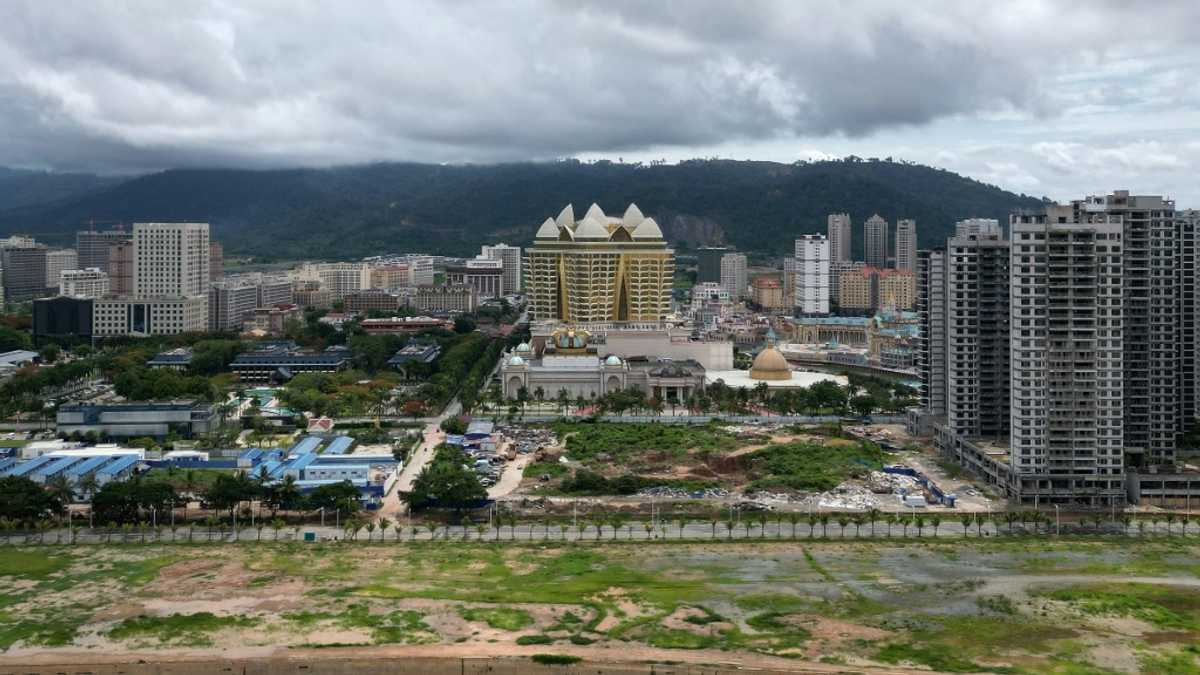The Hidden Facade of the Golden Triangle Special Economic Zone
Nestled along the banks of the Mekong River in Laos, a lotus flower rises above the skyline of a sprawling city that has become infamous for its dark underbelly. This is the Golden Triangle Special Economic Zone (GTSEZ), a place where opulence and crime coexist in a strange harmony. The city’s landscape is a mix of shabby, mismatched facades and high-rise buildings, some of which appear to be unfinished or abandoned. A striking Iberian-style plaza with a church tower, turrets, and statues stands alongside these structures, creating an odd contrast between the past and present.
The GTSEZ was established in 2007, when the Laos government granted the Kings Romans Group a 99-year lease on the area. Initially marketed as an urban development project aimed at attracting tourists with casinos and resorts, it quickly transformed into a hub for money laundering and trafficking. Today, it is widely regarded as a cybercrime center, drawing workers from around the world with the promise of higher-paying jobs than those available in their home countries.
A City of Contrasts
Despite its reputation, the GTSEZ still maintains an air of glamour. During the day, gamblers can be seen placing bets at the blackjack tables of the city’s centerpiece, the Kings Romans Casino, where a Rolls Royce is parked outside. According to a local driver who offers golf buggy tours, the city is home to people from many different countries, including Indians, Filipinos, Russians, and individuals from Africa. “The Chinese mostly own the businesses,” he added, highlighting the significant influence of Chinese investors in the region.
Traffic signs in the GTSEZ are written in Chinese script, and goods such as cigarettes, jade, and counterfeit luxury items are sold in Chinese yuan. Analysts suggest that the towers in the area are leased out as centers for finance and romance scams, a multibillion-dollar industry that continues to thrive despite crackdowns by authorities.
The Role of Zhao Wei and International Sanctions
At the heart of the GTSEZ is Zhao Wei, the founder of the Kings Romans Group and the GTSEZ. He is a Chinese businessman with close ties to the Laos government, having been awarded medals for his development projects. However, Zhao and three associates, along with three of his companies, were sanctioned by the US Treasury in 2018 over what it described as “an array of horrendous illicit activities.” These included human, drug, and wildlife trafficking, as well as child prostitution. In 2023, Britain also sanctioned him, citing his role in trafficking people to the economic zone.
According to Britain’s Treasury, individuals forced into the zone were subjected to physical abuse and cruel treatment while working as scammers targeting English-speaking individuals. Despite efforts by Chinese and Laotian authorities to crack down on cyberfraud operations in the GTSEZ, including raids and arrests, the problem persists.
Adapting to Crackdowns
As public anger in China grows over scamming and alleged kidnappings, Beijing has taken action by launching raids on centers in Myanmar and Cambodia. These operations primarily targeted Chinese workers, resulting in the release and repatriation of thousands of individuals, along with hundreds of foreigners. Some argue that these individuals are trafficking victims or were tricked into working in the scam industry, while others claim they were there voluntarily.
Specialists note that scammers have adapted by shifting their locations and targets. Richard Horsey of the International Crisis Group suggests that trafficking and abuses have decreased as the business model has evolved. “If you’re trying to scale and produce a huge business… violence doesn’t always pay,” he said. “It’s better to have motivated workers who aren’t scared, who aren’t looking over their shoulder.”
Managing Crime Rather Than Eradicating It
Beijing recognizes that it cannot completely eliminate criminal activity in the region, so it prefers to manage it. According to Horsey, Chinese authorities can simply “pick up the phone” and tell Zhao: “Don’t do this, limit this, don’t target Chinese people.” This approach allows China to maintain influence over the region while minimizing the impact of criminal activities.
In 2024, the United States Institute for Peace estimated that Mekong-based criminal syndicates were likely stealing more than $43.8 billion annually. Despite repeated requests for comment, representatives of the GTSEZ and Kings Romans did not respond to inquiries. Zhao could not be reached for comment either.
The Laos government could not be contacted for further information, but the official Lao News Agency stated after last year’s busts that the country was “committed to decisively addressing and eliminating cyber-scam” activity. However, the reality on the ground suggests that the fight against cybercrime in the region remains an ongoing challenge.







